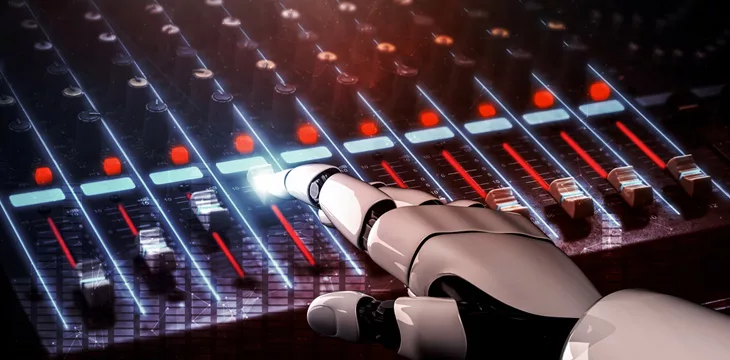|
Getting your Trinity Audio player ready...
|
A new study exploring the impact of artificial intelligence (AI) on music has revealed interesting insights into the adoption of emerging technology by artists.
The study, conducted by music studio Pirate Studios Ltd., revealed that a growing number of musicians are turning to AI to assist in the creation process, but only 48% say they will admit to using the technology. Meanwhile, 53% of surveyed respondents expressed concerns over the reception of music made with AI, opting to conceal its usage.
“Understandably, artists are hesitant about adopting AI in the studio, and also hesitant about broadcasting their use of this controversial new technology,” said Pirate CEO David Borrie.
Borrie stated that the hesitation may result from the fact that AI technology is still in its early days, drawing similarities with the criticisms early adopters of Auto-Tune faced. The music executive predicted that AI may follow a “similar path” before becoming an industry standard tool in the creation process.
Pirate’s study surveyed over 1,141 artists in the United Kingdom, United States, and Germany in a healthy mix of singers, producers, instrumentalists, rappers, and songwriters. According to a report, 25% of respondents admit to experimenting with AI in music, while a majority of musicians yet to explore AI say they will explore the technology in the coming months.
Already, 55% of musicians are learning new AI skills to improve their prompting abilities, while 28% are acquiring skills that can be deployed to AI.
Majority of the polled respondents submit that AI is beneficial in the songwriting and composition process. For others, AI tools are a quick way to validate pre-written lyrics in search of themes and literary meanings, while others use them for rhyming schemes.
“I have asked AI to explain the themes and sentiments discussed in my lyrics,” said one surveyed band member. “It’s helped to validate the overall goal of my songwriting.”
AI-generated songs without human input took the industry by storm in early 2023, with consumers unable to make a clear distinction from the original artists mimicked in the songs. In response, music publishers moved to order streaming platforms like Spotify (NASDAQ: SPOT) to take down all AI-generated songs breaching artists’ copyrights.
Heading to the courts
Not content with removing AI-generated songs from music streaming platforms, music publishers are taking AI firms to court over copyright violations. A coalition of music publishers, including Concord Publishing, Universal Music Group (NASDAQ: UMGNF), and ABKCO Music & Records, dragged Anthropic AI to court for “indiscriminate” use of song lyrics to train its AI chatbot, Claude.
“Unlike songwriters, who are creative by nature, Anthropic’s AI models are not creative—they depend entirely on the creativity of others,” said the filing. “Yet, Anthropic pays nothing to the publishers, their songwriters, or the countless other copyright owners whose copyrighted works Anthropic uses to train its AI models.”
Some industry players have argued that blockchain technology may be used to mitigate copyright claims by proving the source and handling of data used to train AI models.
In order for artificial intelligence (AI) to work right within the law and thrive in the face of growing challenges, it needs to integrate an enterprise blockchain system that ensures data input quality and ownership—allowing it to keep data safe while also guaranteeing the immutability of data. Check out CoinGeek’s coverage on this emerging tech to learn more why Enterprise blockchain will be the backbone of AI.
Watch: Empowering musicians through Blarecast

 03-04-2026
03-04-2026 




